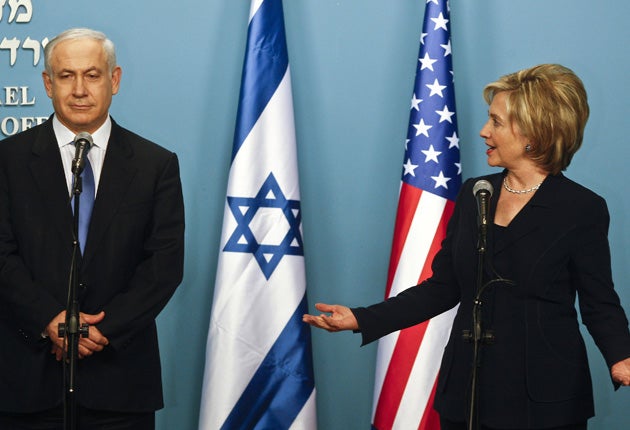Clinton backs Israel on settlements stance
Agreement would allow settlers to finish 3,000 houses plus public buildings

Palestinian leaders angrily accused Hillary Clinton of undercutting Middle East peace prospects yesterday after she endorsed Israel's plans to continue expanding West Bank settlements.
The US Secretary of State for the first time voiced support for Israel's argument that since a freeze on settlement construction had not been a precondition for previous peace talks, it should not be one during the negotiations the US is now trying to convene.
Instead of a freeze, Mrs Clinton urged the Palestinians to accept what she termed an "unprecedented" Israeli offer of "restraint" in settlement construction and to go to the negotiating table as soon as possible without preconditions. "What the Prime Minister [Israel's Benjamin Netanyahu] has offered in specifics on restraints on a policy of settlements is unprecedented," she said in a clear departure from the Obama administration's former position that there needed to be a total freeze. Mrs Clinton was speaking during a joint appearance with Mr Netanyahu. He said that his government would conduct a policy of "restraint" while at the same time enabling "normal life" for the settlers.
However, Palestinians are convinced that use of the word restraint is a deception because, according to US-Israeli understandings, 3,000 housing units whose construction has started will be completed during the freeze, new public buildings can be constructed, and there will be no restriction of settlement construction in annexed East Jerusalem. Ghassan Khatib, a spokesman for President Mahmoud Abbas's Palestinian Authority, said he was "surprised and disappointed" by Mrs Clinton's remarks, terming them "unhelpful" for peace prospects.
Palestinian politicians and analysts doubted that Mr Abbas would, at least in the short term, give in to US pressure to negotiate with Israel after repeatedly saying he would not do so without a settlement freeze. That leaves the US efforts in limbo on an issue Mr Obama had set as one of his top priorities.
Mr Khatib said the US had "deviated" from the international peace blueprint, known as the roadmap, which calls for a settlement freeze. The PA is now expected to mount a diplomatic campaign to oppose the US stance on settlements.
Mr Abbas faced widespread outrage last month after agreeing, under US pressure, to defer a resolution in the UN Human Rights Council endorsing a report critical of Israel's conduct in last winter's Gaza war, though he later reversed his position and the motion passed. Analysts say the anger would flare again if he now resumed talks without a halt to settlement building. "I would advise him not to negotiate," said Bernard Sabella, an MP from Mr Abbas's Fatah movement. "If the US has accepted Netanyahu's position on settlements, I'm sure it will do the same on refugees, borders, water and security. So what is left?"
Palestinian elections likely to take place either in January or June also make it unlikely that Mr Abbas will allow himself to be seen as caving in to US pressure. The Palestinians argue that Israel's settlement building amounts to grabbing land from the future Palestinian state that is supposed to emerge from the talks.
Join our commenting forum
Join thought-provoking conversations, follow other Independent readers and see their replies
Comments
Bookmark popover
Removed from bookmarks